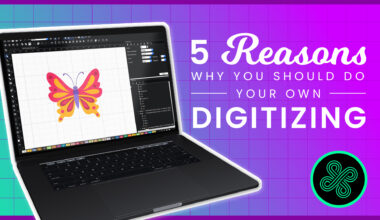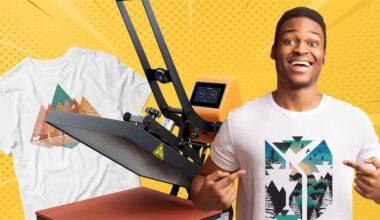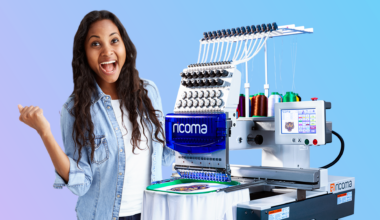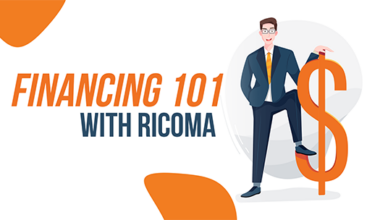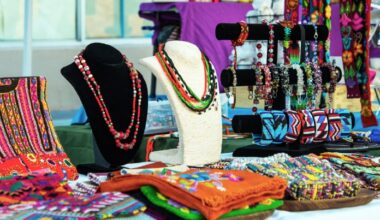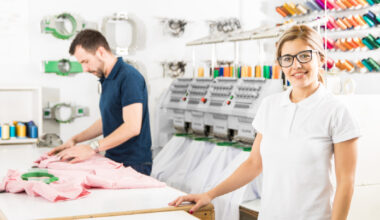Still looking for the perfect embroidery machine for business? You’ve come to the right place because in this article, we’re going to share…
- A comparison chart and analysis of four commercial embroidery machines
- The key features to look for in a commercial embroidery machine
- The top players in the commercial embroidery machine market
Once we’re finished, you’ll have the knowledge you need to make an educated decision and apply what you’ve learned while you’re weighing your options. Let’s jump right in!
The key features in a commercial embroidery machine
If you’re looking for an embroidery machine for business, you probably already know the key features that should be found in a professional embroidery machine.
Most embroidery machine reviews or comparisons usually mention the importance of the following key features:
- Maximum embroidery area: This refers to the area of the sewing field. The larger the sewing field, the wider the variety of designs and garments that can be embroidered. A limited embroidery area will lock you in to a small range of projects and designs. An embroidery machine for business should have a large embroidery area to accommodate the needs of customers who ask for projects and designs of all sizes.
- Memory size: This refers to the embroidery machine’s built-in memory. A machine with a larger memory capacity saves more designs, reducing the time you spend importing and deleting designs from the embroidery machine. For that reason, a larger memory size is more common in an embroidery machine for business than in a home embroidery machine.
- Usability: This refers to how long the embroidery machine will last throughout the years and how long the machine is designed to run. Many people who want an embroidery machine for business purposes will opt for a commercial grade embroidery machine rather than a home embroidery machine. However, some get started with a home embroidery machine to get their foot in the door. Later, they’ll upgrade to a commercial embroidery machine because they’re built to last a lot longer, are designed to run daily and are more efficient if you’re looking to really profit in the business.
But aside from those obvious must-haves, you’ll also need to take a look at the following perks offered by the embroidery machine company (and why they’re essential specifically for a commercial grade embroidery machine.)
- Financing: Financing is a main benefit to keep in mind when buying an embroidery machine for business purposes. For some reason, embroidery machine reviews fail to mention the importance of flexible payment plans. If you finance, embroidery machine payments will be low each month so you can start operating at a profit from the moment you start your business. That way, the cost of embroidery machine supplies will be the main costs you’ll have to worry about because your monthly payments will be low and manageable. A commercial embroidery machine is typically more expensive than the average home embroidery machine, so you’re definitely going to rather make small payments as you ramp up your embroidery business.
- Attachments: This refers to the package as a whole. You should be paying attention to the contents of the embroidery machine package, like whether or not the machine comes with hoops. If it does, how many are included? Does it bring a cap attachment at no additional cost? Does it include cap hoops? These are all questions you need to be asking because you definitely don’t want to get stuck paying extra for attachments, so be sure the package is all-inclusive to really get the most value from your purchase. That way, you won’t have to worry about coming up with more money to pay for something you need. Embroidery machine businesses make an extra $2,000 to $3,000 off “all-inclusive starter kits” that should already be included within the price of the machine itself.
Now that we’re familiar with the key features to lookout for in a commercial embroidery machine, you have the knowledge you need to make an educated decision and choose an embroidery machine that fits your needs. In the next section, we’re going to take a look at a comparison of four popular commercial embroidery machines.
Who are the top players in the commercial embroidery machine market?
If you’ve been looking for an embroidery machine, you may have noticed there are a few setbacks with most embroidery machine reviews…
- They are outdated.
- Most embroidery machine reviews only review consumer models and ignore the commercial embroidery machine.
However, if you have happened to come across the few commercial embroidery machine reviews out there, these are some of the main names you’ve probably seen tossed around:
- Tajima embroidery machine
- SWF embroidery machine
- Happy embroidery machine
- Ricoma embroidery machine
The chart below details the specs of each of these embroidery machines. Check out how they match up to each other.
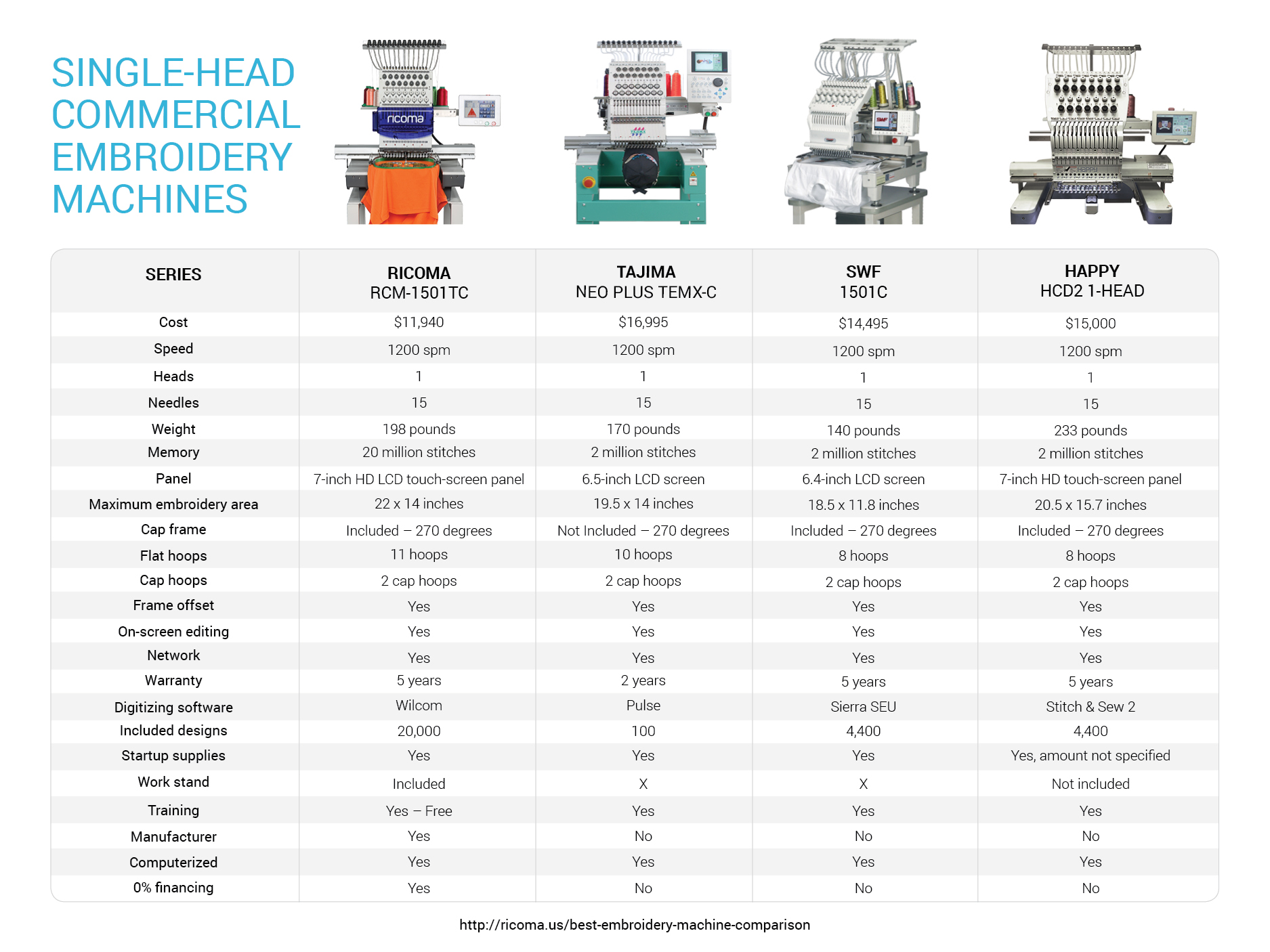
Cost: We’re starting with cost because that’s the first question we always get. The cost varies from around $12,000 to $17,000. The Ricoma embroidery machine is the most affordable brand of the four, while the Tajima embroidery machine is the most expensive. The SWF embroidery machine and the Happy embroidery machine are somewhere in the middle when it comes to price. Keep in mind, this is MSRP that we’re showing here so the price will vary depending on the dealer (this is just the most accurate estimate we can get). Depending on your dealer, they will charge extra for attachments or upsell you to an all-inclusive package for a couple thousand dollars more. The Ricoma embroidery machine price is an all-inclusive price. That means you will get the entire package for the price you see.
Category winner: Ricoma
Needles: An embroidery machine for business purposes usually has about 15 needles. The reason why it’s important to look at the number of needles is because the more needles the machine has, the more efficient the machine will be. If the machine has more needles, you won’t have to swap the thread and rethread the needle every time you want to embroider a different color. Out of this list, these are all the same across the board.
Category winner: All
Digitizing software: Most brands will include some digitizing software with the purchase (usually a lite or basic version where you can edit some already-digitized designs). If you’re looking for an embroidery machine for business use, chances are, you probably won’t need to do full digitizing. Most likely, you’ll just need to do minimal editing, which you can definitely achieve with the lite version. You’ll also have the option to purchase the full version of the embroidery software, but it’s not necessary if you choose to outsource your digitizing. Through our experience working with embroidery businesses, we’ve learned about 80% of businesses outsource their digitizing. This is mainly because you can get a digitized design anywhere from $5 to $10, while digitizing your own design usually takes hours (which won’t make as much sense for the growth and efficiency of your business).
Category winner: All
Cap attachment: If you want to embroider caps, you’ll need a cap attachment. The cap embroidery machine attachment is already included within the Ricoma embroidery machine price. It’s also included within the price of the Happy and SWF embroidery machine. The Tajima embroidery machine has an equally wide cap frame, but the main downside is that customers have to pay additional for the attachment if they want to do cap embroidery. Machine cap attachments for these brands can cost up to $1,500. The cap embroidery attachment is a wise choice for anyone who wants a versatile embroidery machine. Not to mention, custom hats are both highly profitable and in high demand. With the Ricoma embroidery machine, you won’t spend any extra money on these parts because they’re already included with the machine.
Category winner: Ricoma
Speed: Maximum embroidery speed is important because it will help determine how fast you can complete a project. You’ll definitely want to complete projects faster if you’re looking to run a profitable embroidery business. This is the same across the board with each of these embroidery machine brands at 1,200 stitches per minute, which is the standard speed for many commercial embroidery machines.
Category winner: All
Memory size: This is a pretty important feature because it determines how many designs your machine can hold in its internal memory. Memory size is crucial mainly because it increases efficiency by reducing the time spent going back and forth uploading and deleting designs. For instance, if have a repeat client, you’ll want to keep their logo in your machine’s memory.
Category winner: Ricoma
Maximum embroidery area: This feature refers to the area of the sewing field. This is an important embroidery machine feature because it will determine the variety of garments you can embroider. Here, the Ricoma embroidery machine and Happy embroidery machine are leading the pack. However, these are all pretty large embroidery areas with ample space.
Category winner: Ricoma and Happy
Flat hoops: The flat hoops are the actual frames your design will be embroidered within. If you’re not familiar with machine embroidery, you’ll need these hoops to support your garment and prepare it for machine embroidery. The Ricoma embroidery machine comes in first with 11 hoops; the Tajima embroidery machine package provides 10; and both the Happy and SWF embroidery machine tie at eight hoops. Most embroidery machine suppliers will provide flat hoops as part of the embroidery machine package. However, the number of hoops included will vary slightly by the embroidery machine business or distributor.
Category winner: Ricoma
Cap hoops/rings: On the other hand, whether or not the embroidery machine includes cap hoops will vary. This is mostly because you have to pay extra for a cap attachment with other suppliers so, of course, they won’t give you a cap hoop before you even have a cap attachment. The Ricoma embroidery machine includes cap hoops because it’s the only machine that includes the cap attachment within the initial embroidery machine price. All of these embroidery machine suppliers provide two cap hoops when you purchase the cap attachment. Again, some include the cap attachment in the price and others don’t.
Category winner: Varies by distributor
Control panel: The size of the panel is more of a cosmetic feature, but it’s also very important if you want something clean and easy to see and operate. Both the Ricoma embroidery machine and Happy embroidery machine have a 7-inch touch screen. The Tajima embroidery machine and SWF embroidery machine follow at about 6 ½ inches, which won’t make much of a difference.
Category winner: Ricoma and Happy
Warranty: This is pretty standard across the board. As far as parts and labor, it varies a bit by brand but it’s usually somewhere from 1 to 2 years. For electronic parts, it’s usually 2 to 3 years; and for drive train components, it’s about five years.
Category winner: All
Financing: Financing is the best solution for a commercial embroidery machine, as they’re typically more costly than your average home embroidery machine. If you can finance at 0%, it’s even better because it eliminates both upfront costs and crazy interest rates. In this section, Ricoma is the only company that offers 0% financing* at this time, so that’s definitely something to keep in mind if you rather save money in the long-term and generate a larger profit from the very beginning.
*0% FINANCING BASED ON APPROVED CREDIT
Category winner: Ricoma
Final takeaway: This embroidery machine review compares the single-head commercial embroidery machine for the brands Ricoma, Tajima, SWF and Happy. Consistently leading in almost every category, the Ricoma embroidery machine was the overall winner. Meanwhile, most machines tied in many of the categories. Most of the single-head commercial embroidery machines we reviewed are up-to-date with the standard industry features. The main difference is the embroidery machine price and the contents included in each embroidery machine package. While Tajima is a well-established brand with a great reputation, its machines are significantly more expensive than the SWF embroidery machine or the Ricoma embroidery machine (even though the main features are basically the same across the board.) All in all, you would get the highest value opting for the Ricoma embroidery machine because all of the attachments are included within the initial embroidery machine price. Meanwhile, the other brands charge thousands more for attachments, which makes the embroidery machine price even higher.
This research and review was conducted by Ricoma. This information was found in 2017 and is currently available on the internet. There are many other embroidery machine brands out there that have not been mentioned, but these are the top 4 being searched (and that our clients ask us about).
Want to learn more? We put together the top 5 factors to consider when purchasing an embroidery machine. For any additional information about Ricoma or our machines, you can click here to check out Ricoma comparison charts and videos or go here to schedule a virtual demo.
Want to see one of our machines in action?
Schedule a free virtual demo if you want to see any of our machines in action. In it, you can ask any questions you have about the industry and see exactly how to start and run an embroidery project in real time.

